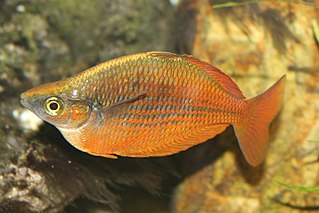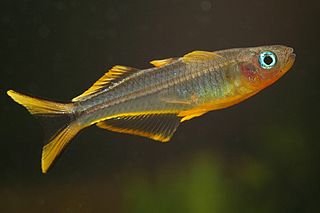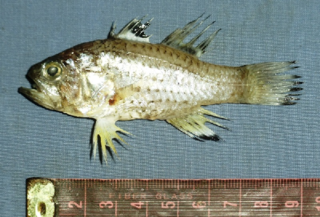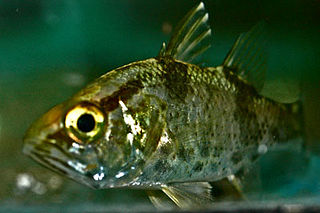
Rainbowfishes are small, colourful freshwater fishes belonging to the family Melanotaeniidae, found in northern and eastern Australia, New Guinea, Sulawesi and Madagascar.

Cardinalfishes are a family, Apogonidae, of ray-finned fishes found in the Atlantic, Indian, and Pacific Oceans; they are chiefly marine, but some species are found in brackish water and a few are found in fresh water. A handful of species are kept in aquariums and are popular as small, peaceful, and colourful fish. The family includes about 370 species.

Rasbora is a genus of fish in the family Cyprinidae. They are native to freshwater habitats in South and Southeast Asia, as well as southeast China. A single species, R. gerlachi, is only known from an old specimen that reputedly originated from Africa (Cameroon), but this locality is considered doubtful. They are small, up to 17 cm (6.7 in) long, although most species do not surpass 10 cm (4 in) and many have a dark horizontal stripe.

Apogon is a large genus of fish in the family Apogonidae, the cardinalfishes. They are among the most common fish on coral reefs. Over 200 species have been classified in genus Apogon as members of several subgenera. Some of these subgenera, such as Ostorhinchus, have been elevated to genus status, leaving just over 50 species in the genus.

Schismatogobius is a genus of fish in the subfamily Gobionellinae. They are native to southern and eastern Asia, Australia and the Pacific Islands. Adults dwell in freshwater habitat such as streams and rivers, where they live along the sand and gravel substrates.

Glossolepis is a genus of rainbowfishes from New Guinea.

Glossogobius is a genus of gobies native to fresh, brackish and marine waters from Africa to the coasts of the western Pacific Ocean. They are found in Madagascar, South Africa, Japan, Thailand, Australia, Indonesia, Bangladesh, the Philippines, Taiwan, Papua New Guinea, Singapore, Malawi, Eswatini, Botswana, Kenya, Zimbabwe, Tanzania, Mozambique, the Solomon Islands, Palau, Fiji, New Caledonia, India, Laos, Sri Lanka, Myanmar, Borneo, Nepal, Brunei Darussalam, Micronesia, Cambodia, Vietnam, China, Réunion, the Seychelles, Mauritius, the Caroline Islands, Vanuatu, Malaysia and Russia. The genus also includes a troglobitic species, G. ankaranensis.
Lentipes is a genus of gobies in the family Oxudercidae, native to fresh, marine and brackish waters of the Malay Archipelago and islands in the Pacific. Its species are typically from fast-flowing streams and some are anadromous.

Melanotaenia is a genus of rainbowfish from Australia, Indonesia, New Guinea, and nearby smaller islands.

Mogurnda is a genus of freshwater fishes in the family Eleotridae native to eastern and northern Australia and New Guinea. Several species are endemic to Lake Kutubu in Papua New Guinea.

Oryzias is a genus of ricefishes native to fresh and brackish water in east and south Asia. Some species are widespread and the Japanese rice fish is commonly used in science as a model organism, while others have very small ranges and are threatened. They are small, up to 8 cm (3.1 in) long, and most are relatively plain in colour.

Oxyeleotris is a genus of sleeper gobies mostly restricted to Australia and New Guinea, though some are found in Southeast Asia.

Pseudomugil is a genus of fish in the subfamily Pseudomugilinae endemic to Australia and New Guinea, where they are found in freshwater rivers and streams and bodies of brackish water.

Sicyopterus is a genus of gobies native fresh waters from Madagascar to the Pacific islands.

Stenogobius is a genus of fish in the goby subfamily, Gobionellinae. They are native to fresh, brackish and marine waters along the coasts of the Indian and Pacific Oceans. They are known commonly as coastal stream gobies.

Apogonichthyoides is a genus of fish in the family Apogonidae, the cardinalfishes. They are native to the Indian Ocean and the western Pacific Ocean.

Jaydia is a genus of fishes in the family Apogonidae native to the western Pacific Ocean.

Siphamia is a genus of cardinalfishes native to the Indian and Pacific Ocean. Several of these species are commensal with various species of sea urchins.

Glossamia aprion is a species of freshwater ray-finned fish from the family Apogonidae, the cardinalfishes, from northern Australia and New Guinea. In Australia, it is commonly known as the mouth almighty.

















